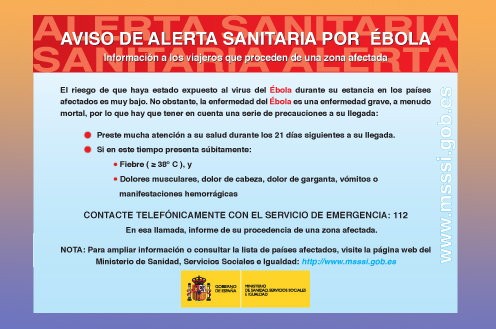Efforts to combat the Ebola outbreak
Spanish Ministry of Health steps up efforts to inform travellers and Spanish nationals resident in countries affected by Ebola outbreak
News - 2014.8.14
The recommendations also include a number of precautions that should be taken when returning home, which is when particular attention should be paid to any symptoms such as a high temperature or vomiting.
The ministerial department has instructed staff of its Overseas Health Service to distribute informative posters at airports over the next few days to raise awareness about the health alert associated with the Ebola outbreak and to provide information to travellers coming back from the affected areas. The posters state that, although there is only a very low risk of a traveller having been exposed to the Ebola virus during their stay in the affected countries, it is a serious disease and certain precautions should be taken upon their arrival.
Travellers are asked to call the emergency service (112) if they suddenly start experiencing a temperature of 38ºC or above together with muscle pains, headaches, a sore throat, vomiting or bleeding, and to inform the person on the end of the line that they have come from an area affected by the Ebola outbreak.
This was one of the topics tackled by the Public Health Commission today, a meeting of which was held this morning at the Ministry of Health, Social Services and Equality. The meeting was chaired by the Director-General for Public Health, Mercedes Vinuesa, and attended by health officials from all regional governments.
Further information was provided at the meeting on the steps being taken to monitor the current situation regarding the Ebola outbreak in Africa and the procedure was updated according to the latest information available. The information being provided to travellers at airports is among the latest developments, given that direct flights are operated between Madrid and the most recent country to be affected - Nigeria.
Furthermore, and via the consulates, recommendations are being offered to those Spanish nationals who live in the affected countries. These recommendations include avoiding direct contact with the blood or bodily fluids of a patient or corpse, or with objects that could be contaminated, as well as to avoid direct contact with wild animals and the consumption of their meat. Additionally, recommendations are being made to ensure proper hand-washing habits are scrupulously maintained.
Further information can be found on the website of the Ministry of Health, Social Services and Equality.





